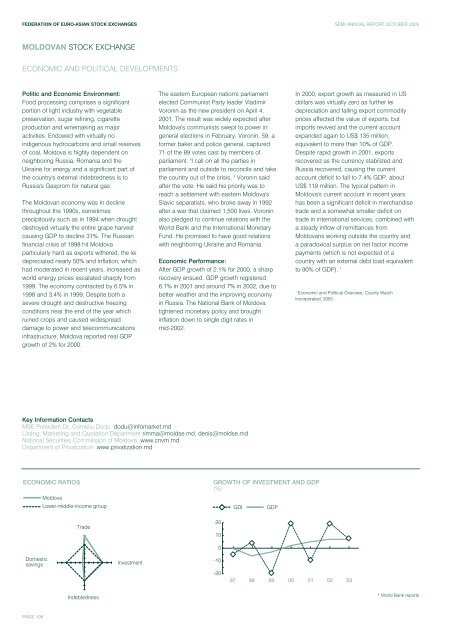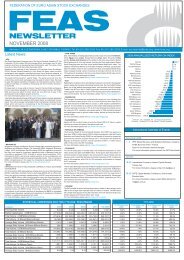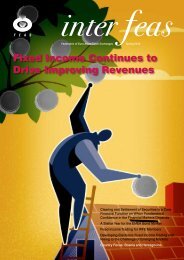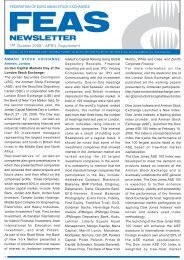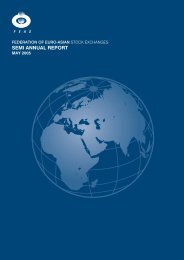Download - FEAS
Download - FEAS
Download - FEAS
Create successful ePaper yourself
Turn your PDF publications into a flip-book with our unique Google optimized e-Paper software.
FEDERATION OF EURO-ASIAN STOCK EXCHANGES SEMI ANNUAL REPORT OCTOBER 2005<br />
MOLDOVAN STOCK EXCHANGE<br />
ECONOMIC AND POLITICAL DEVELOPMENTS<br />
Politic and Economic Environment:<br />
Food processing comprises a significant<br />
portion of light industry with vegetable<br />
preservation, sugar refining, cigarette<br />
production and winemaking as major<br />
activities. Endowed with virtually no<br />
indigenous hydrocarbons and small reserves<br />
of coal, Moldova is highly dependent on<br />
neighboring Russia, Romania and the<br />
Ukraine for energy and a significant part of<br />
the country's external indebtedness is to<br />
Russia's Gasprom for natural gas.<br />
The Moldovan economy was in decline<br />
throughout the 1990s, sometimes<br />
precipitously such as in 1994 when drought<br />
destroyed virtually the entire grape harvest<br />
causing GDP to decline 31%. The Russian<br />
financial crisis of 1998 hit Moldova<br />
particularly hard as exports withered, the lei<br />
depreciated nearly 50% and inflation, which<br />
had moderated in recent years, increased as<br />
world energy prices escalated sharply from<br />
1999. The economy contracted by 6.5% in<br />
1998 and 3.4% in 1999. Despite both a<br />
severe drought and destructive freezing<br />
conditions near the end of the year which<br />
ruined crops and caused widespread<br />
damage to power and telecommunications<br />
infrastructure, Moldova reported real GDP<br />
growth of 2% for 2000.<br />
PAGE 106<br />
The eastern European nation's parliament<br />
elected Communist Party leader Vladimir<br />
Voronin as the new president on April 4,<br />
2001. The result was widely expected after<br />
Moldova's communists swept to power in<br />
general elections in February. Voronin, 59, a<br />
former baker and police general, captured<br />
71 of the 89 votes cast by members of<br />
parliament. "I call on all the parties in<br />
parliament and outside to reconcile and take<br />
the country out of the crisis, " Voronin said<br />
after the vote. He said his priority was to<br />
reach a settlement with eastern Moldova's<br />
Slavic separatists, who broke away in 1992<br />
after a war that claimed 1,500 lives. Voronin<br />
also pledged to continue relations with the<br />
World Bank and the International Monetary<br />
Fund. He promised to have good relations<br />
with neighboring Ukraine and Romania.<br />
Economic Performance:<br />
After GDP growth of 2.1% for 2000, a sharp<br />
recovery ensued. GDP growth registered<br />
6.1% in 2001 and around 7% in 2002, due to<br />
better weather and the improving economy<br />
in Russia. The National Bank of Moldova<br />
tightened monetary policy and brought<br />
inflation down to single digit rates in<br />
mid-2002.<br />
Key Information Contacts<br />
MSE President Dr. Corneliu Dodu dodu@infomarket.md<br />
Listing, Marketing and Quotation Department rimma@moldse.md, denis@moldse.md<br />
National Securities Commission of Moldova www.cnvm.md<br />
Department of Privatization www.privatization.md<br />
ECONOMIC RATIOS<br />
Domestic<br />
savings<br />
Moldova<br />
Lower-middle-income group<br />
Trade<br />
Indebtedness<br />
Investment<br />
GROWTH OF INVESTMENT AND GDP<br />
(%)<br />
20<br />
10<br />
0<br />
-10<br />
-20<br />
97<br />
GDI GDP<br />
In 2000, export growth as measured in US<br />
dollars was virtually zero as further lei<br />
depreciation and falling export commodity<br />
prices affected the value of exports, but<br />
imports revived and the current account<br />
expanded again to US$ 135 million,<br />
equivalent to more than 10% of GDP.<br />
Despite rapid growth in 2001, exports<br />
recovered as the currency stabilized and<br />
Russia recovered, causing the current<br />
account deficit to fall to 7.4% GDP, about<br />
US$ 119 million. The typical pattern in<br />
Moldova's current account in recent years<br />
has been a significant deficit in merchandise<br />
trade and a somewhat smaller deficit on<br />
trade in international services, combined with<br />
a steady inflow of remittances from<br />
Moldovans working outside the country and<br />
a paradoxical surplus on net factor income<br />
payments (which is not expected of a<br />
country with an external debt load equivalent<br />
to 90% of GDP). 1<br />
1 Economic and Political Overview, County Watch<br />
Incorporated, 2005<br />
98 99 00 01 02 03<br />
* World Bank reports


